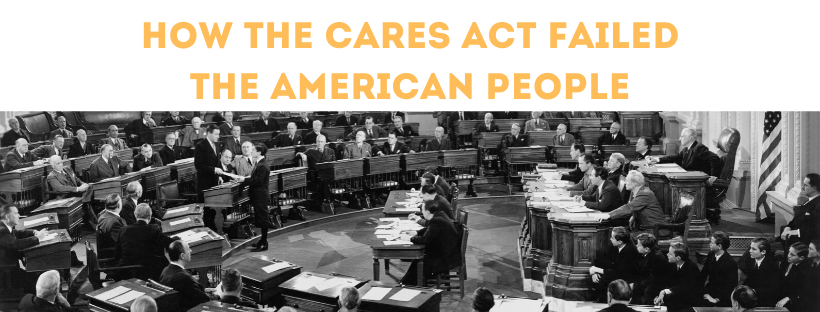How the CARES Act Failed the American People
On March 25th, the government passed the CARES Act, a bipartisan and historic stimulus package totaling roughly $2 trillion. So why has this package done so little to help real people?
There are four main reasons…
- It went to wrong people. Between tax cuts, corporate loopholes, using banks as intermediaries, much of the funding that should have gone to small businesses and everyday working people instead ended up lining the pockets of corporations and the super rich. A tax loophole favoring real estate speculators and hedge fund managers cut their tax bills by shifting losses to prior tax years. This totals in $195 billion from the treasury which will go to 43,000 people who earn over $1 million annually…with no strings attached. The Paycheck Protection Program was supposed to be for small businesses with 500 or fewer employees but ended up being exploited by franchises that had 500 or fewer employees at each location.
- There was no oversight. On April 7th, President Trump fired Inspector General Glenn A. Fine who was assigned to oversee and hold accountable the terms of the stimulus package. Corporations were given bailout money under the condition that they retain their employees. But with no oversight, this requirement has no teeth, as demonstrated by Boeing’s acceptance of the funds and subsequent layoff of workers.
- Not enough money was allocated where it was needed. A $1200 one-time stimulus check isn’t enough to last two weeks, let alone for the foreseeable future during a pandemic. The loans given out by the Paycheck Protection Program and Emergency Disaster Relief did little to actually offset small businesses’ losses. And $153.5 billion for public health does not come close to funding enough PPE, overtime for healthcare workers or a robust and aggressive contact tracing and testing initiative, all of which is sorely needed to reopen the country and support the economy. While unemployment was expanded, its infrastructure was quickly overwhelmed and essential workers remained hostages, forced to work at their jobs despite the risks as quitting would disqualify them from benefits.
- Poor infrastructure. All the money in the world doesn’t make a difference if it can’t get where it needs to go. Distributing funds is a massive undertaking that the United States Government was unprepared for and poorly executed. People are still waiting on their stimulus checks, which you need a social security number and to have filed taxes recently to receive–leaving out over 7 million households and 16.7 million Americans. SBA loans are way behind processing applications and the Paycheck Protection Program ran out of funding within 13 days, with a significant amount of funds going to publicly traded companies that had connections with the private banks rolling out the loans. The first day the program was given more money after it ran out, the site crashed.
The package isn’t all bad. For example, the unemployment measures that expanded qualifications to cover gig-workers and the partially employed in addition to an extra $600+/wk were a great start — but they are still only a start.
Many other developed nations were able to adapt quickly, kept unemployment low and contained the virus. The government of Denmark is covering 75-90% of workers compensation at companies for three months on the condition that employees are not fired. Here in the US, the pandemic rages on and, despite partial re-openings, the economy, small businesses and working people are suffering. The federal government has checked out, leaving states, and millions of people, desperately in need of funding, guidance and financial help, on their own. Hopefully, another stimulus bill, without the loopholes, misallocations and lack of oversight and infrastructure, will pass.
Yours in Strength,
The Take Back Control Team




Leave a Reply
Want to join the discussion?Feel free to contribute!